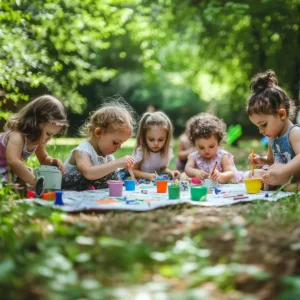Activity
Similar Activities
Picnic Adventure: Pretend Cooking Play for Toddlers
Children’s Age: 2–3 years
Activity Duration: 10 – 30 minutes
An imaginative activity where children (ages 2-3) engage in pretend cooking during a picnic adventure.
Activity Duration: 10 – 30 minutes
Holiday Emotions Puzzle: Festive Empathy Exploration
Children’s Age: 4–6 years
Activity Duration: 10 – 15 minutes
The "Holiday Emotions Puzzle" activity is designed for children aged 48 to 72 months to develop self-care skills, empathy, and language through logical games and puzzles. Children …
Activity Duration: 10 – 15 minutes
Outdoor Tea Party and Fix-it Fun for Toddlers
Children’s Age: 2–4 years
Activity Duration: 10 – 25 minutes
Let's create a fun Outdoor Tea Party and Fix-it Station for kids aged 1 to 3. Set up a table and chairs, play tea set, pretend tools, household items for fixing, a picnic blanket, …
Activity Duration: 10 – 25 minutes
Enchanted Digital Nature Scavenger Hunt: A Journey Through Technology and Nature
Children’s Age: 12–16 years
Activity Duration: 30 – 40 minutes
The Digital Nature Scavenger Hunt is a engaging activity tailored for children aged 12 to 16, promoting language development, communication skills, empathy, and computer literacy. …
Activity Duration: 30 – 40 minutes
Cultural Photo Exploration: World Wonders Journey
Children’s Age: 6–10 years
Activity Duration: 20 minutes
Embark on the "Cultural Photo Exploration" activity to boost children's play skills, cultural awareness, and academic development through an outdoor photography journey. Choose a d…
Activity Duration: 20 minutes
Enchanted Time Travel Storytelling Adventure
Children’s Age: 10–12 years
Activity Duration: 25 – 35 minutes
Embark on the "Time Travel Storytelling Adventure" to spark ecological awareness and historical curiosity through imaginative play. Create a cozy storytelling setting with cushions…
Activity Duration: 25 – 35 minutes
Empathy through Dance: Expressing Emotions Creatively
Children’s Age: 6–10 years
Activity Duration: 25 minutes
"Empathy through Dance" is an engaging activity tailored for children aged 6 to 10 to foster empathy, moral growth, and language skills. Children will express emotions through move…
Activity Duration: 25 minutes
Nature Storytelling: Eco Tales Under the Trees
Children’s Age: 11–15 years
Activity Duration: 30 – 40 minutes
Engage children aged 11 to 15 in academic and ecological learning with the Nature Storytelling activity. No materials are required as kids gather in a natural outdoor setting like …
Activity Duration: 30 – 40 minutes
The Eco-Innovators Theater Play: Imagining Ecological Tales
Children’s Age: 6–10 years
Activity Duration: 15 – 30 minutes
The Eco-Innovators Theater Play activity is perfect for children aged 6 to 10 to explore ecological awareness creatively. No materials are required for this indoor play. Children c…
Activity Duration: 15 – 30 minutes
Seasonal Shapes Playdough Sculpting Adventure
Children’s Age: 4–6 years
Activity Duration: 15 – 20 minutes
Engage children aged 48 to 72 months in a Playdough Sculpting activity focusing on seasonal shapes to boost fine motor skills, creativity, and emotional regulation. Provide playdou…
Activity Duration: 15 – 20 minutes
Engaging Holiday Memory Game for Kids
Children’s Age: 2–6 years
Activity Duration: 10 minutes
Let's play the Holiday Memory Game! You and your child can enjoy this fun activity together without needing any materials. Find a cozy spot, sit down, and get ready to play.
Sta…
Activity Duration: 10 minutes



























